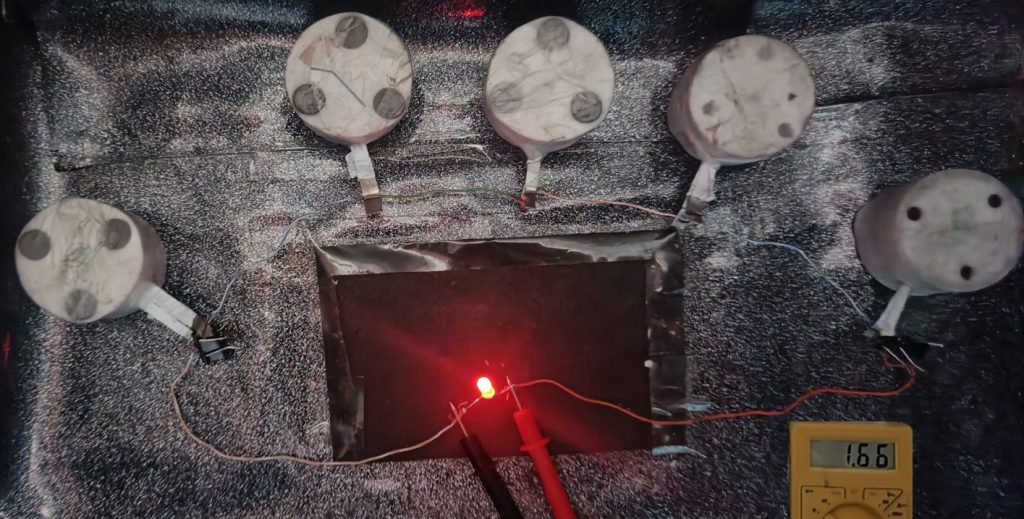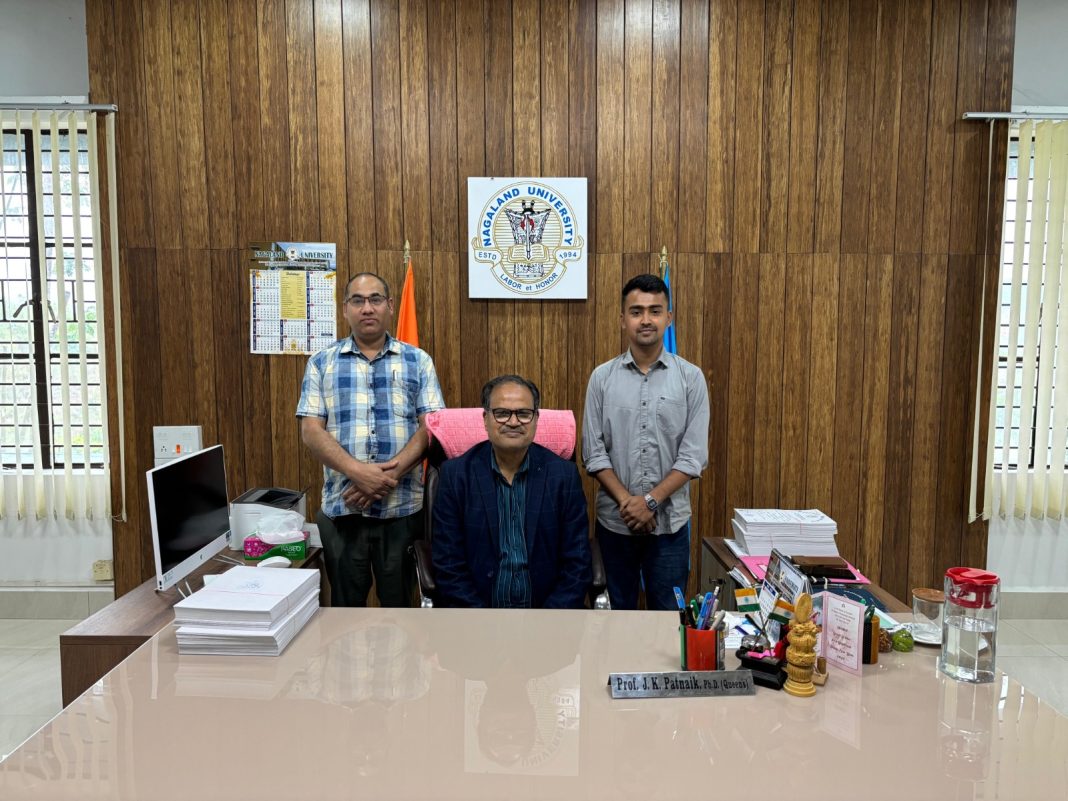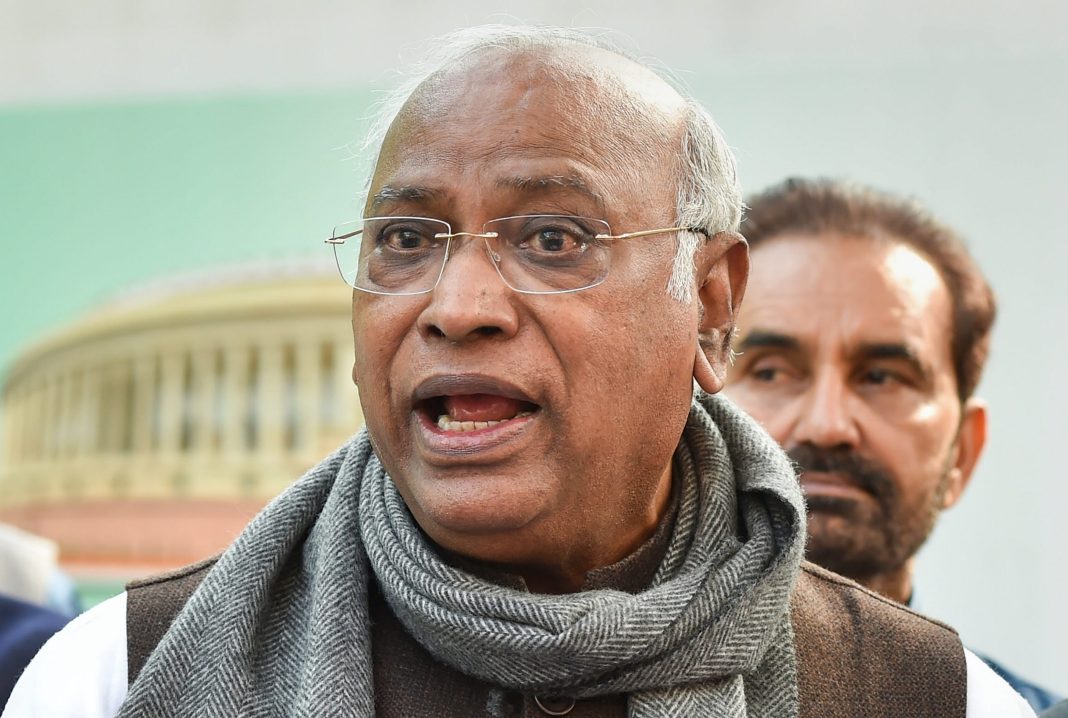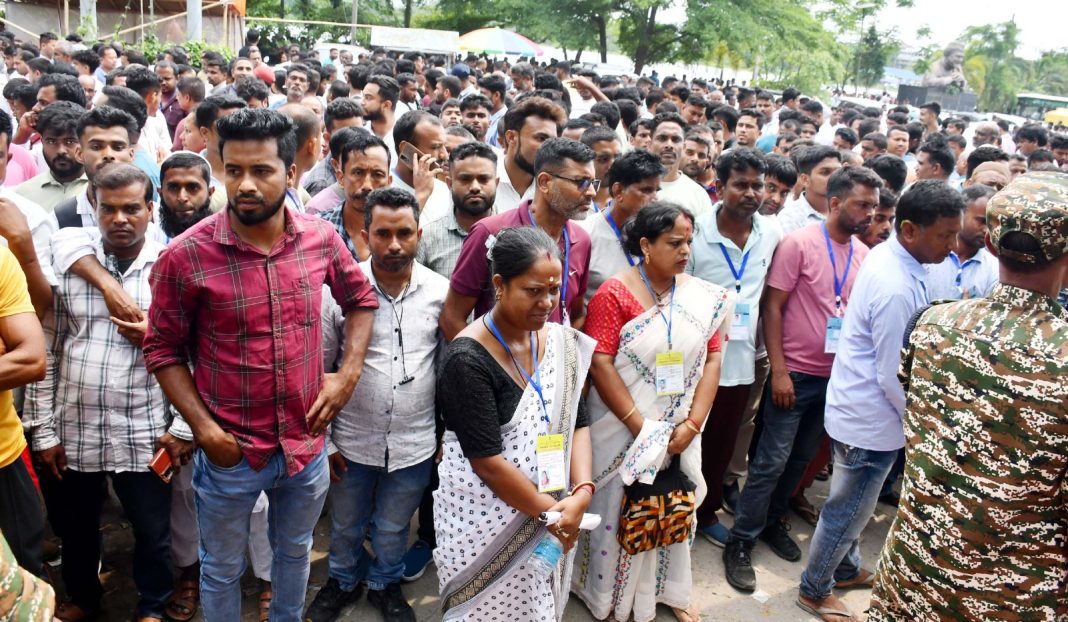
Guwahati, May 12: Dipankar Hazarika, a PhD scholar from Nagaland University, has emerged as one of just 13 innovators in India selected for the prestigious Energy Innovation Fellowship Grant by the Royal Norwegian Embassy in New Delhi.

His cutting-edge work on hydrogel-based battery electrolytes could reshape the future of sustainable, flexible, and wearable energy storage technologies.
Working under the mentorship of Dr. Nurul Alam Choudhury in the Department of Chemistry, Hazarika’s project titled “Sustainable Biopolymer-based Hydrogel Electrolytes for Next-generation Solid-state Energy Storage” focuses on developing safer, biodegradable alternatives to conventional battery electrolytes—offering a leap forward for clean energy and rural energy equity.
His lab-scale prototype, based on chitosan and non-toxic ionic crosslinkers, has shown exceptional performance with 51,500 stable cycles in an all-solid-state supercapacitor. An Indian patent has already been filed for the innovation, and the research was recently published in the Journal of Power Sources (Impact Factor 8.1).

The Fellowship—supported by Innovation Norway, NITI Aayog, TERI, and Atal Incubation Centers—comes with expert mentorship through IIT Madras’ Energy Consortium, led by Dr Nikhil Tambe, and is aimed at scaling tech-readiness, product translation, and real-world deployment. The regional host for the Northeast is AIC-SMUTBI (Sikkim Manipal University), led by Prof. Tej Chingtham.
Hazarika, one of only two fellows selected from the Northeast, thanked the Norwegian Embassy, Nagaland University, and his mentors, stating, “This Fellowship strengthens our ability to scale and commercialize research that supports India’s sustainable energy goals.”
Nagaland University Vice-Chancellor Prof. Jagadish K. Patnaik congratulated Hazarika, calling the achievement “a proud moment” for the university’s growing reputation in impactful research.
Dr. Choudhury emphasized the broader implications of the innovation: “Electrolytes are a critical but under-researched component in energy storage. Our hydrogel alternative offers a safer, biodegradable, and high-performing solution for the next generation of batteries.”
The initiative underscores a national push for indigenous innovation in energy technology, vital for achieving India’s 2070 net-zero emission target and expanding clean energy access across rural communities.
Dipankar Hazarika is one of the only 13 innovators in the country to be selected for this Fellowship Grant. This initiative is being implemented in collaboration with Innovation Norway, NITI Aayog (Government of India), The Energy and Resources Institute (TERI), and Atal Incubation Centers (AICs).
The regional host for the North East is AIC-SMUTBI (Atal Incubation Center – Sikkim Manipal University Technology Business Incubation), led by Prof. Tej Chingtham, CEO of AIC-SMUTBI.
Congratulating the research scholar on his path-breaking work, Prof. Jagadish K. Patnaik, Vice-Chancellor, Nagaland University, said, “I wholeheartedly congratulate Dipankar Hazarika on this prestigious achievement. This milestone reflects the growing research excellence at Nagaland University and inspires others to pursue impactful science”.
The Fellowship also offers mentorship and entrepreneurial guidance from national experts. Dr Nikhil Tambe, CEO of The Energy Consortium at IIT Madras, is one of the key mentors guiding the fellows through technology readiness scaling, product translation, and real-world deployment.
Expressing his gratitude to the Royal Norwegian Embassy, TERI, and NITI Aayog for partnering with AIC-SMUTBI to support battery technology innovations in NorthEast, Prof. Tej Chingtham, CEO, AIC-SMUTBI, said, “This collaboration empowers local start-ups working on clean energy solutions, and we look forward to continued cooperation in driving sustainable impact together.”
Out of over 100 proposals submitted from five regions across India—Uttar Pradesh, Rajasthan, Punjab, Haryana, and the North East—only 13 innovators were selected. Mr. Dipankar Hazarika was among the two selected fellows from the Northeast to move forward in Phase I of the program.
His awarded project is titled ‘Sustainable Biopolymer-based Hydrogel Electrolytes for Next-generation Solid-state Energy Storage’.
Highlighting the importance of such research and innovation, his PhD Supervisor, Dr. Nurul Alam Choudhury, Assistant Professor, Department of Chemistry, Nagaland University, said, “Dipankar’s achievement is a proud moment for our laboratory and the university.
His research shows promise in solving real-world energy challenges with sustainable approaches. Biopolymers—such as chitosan (derived from crab and shrimp shells), gelatin, starch, and cellulose—are renewable, biodegradable, low-cost, and safe. They serve as ideal candidates to replace petroleum-derived synthetic materials in green energy applications.”
Dr. Nurul Alam Choudhury added, “While electrolytes are just as critical as electrodes in energy storage devices, research on electrolytes has received comparatively less attention. This is mainly due to the complexity involved in designing stable, safe, and high-performing electrolyte materials, as well as their lower visibility in performance metrics compared to electrodes, which often get more recognition for improving energy density.”
Most conventional electrolytes used today are liquid-based. While they perform adequately, they suffer from serious limitations such as leakage, toxicity, and high flammability. These safety and environmental concerns have limited their suitability for use in next-generation technologies like flexible or wearable electronics.

To overcome these challenges, Nagaland University researchers focused on quasi-solid hydrogel electrolytes, providing a safer, biodegradable, and more stable alternative. This approach addresses a long-overlooked yet critical component of next-generation energy storage systems. Hazarika’s hydrogel membrane electrolyte is based on chitosan and a non-toxic ionic crosslinker such as sodium carbonate.





